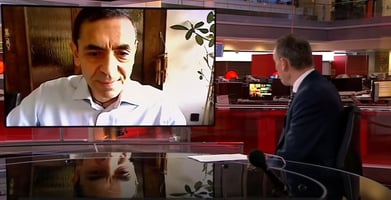Spokespeople are precious.
To make the most of media opportunities and raise your company's profile, you need spokespeople who can communicate your message with clarity, confidence and composure.
To do that, even the most experienced spokespeople require plenty of support.
Much of that support comes from realistic media training that prepares them for the different challenges posed by broadcast, print and online interviews.
But there are also steps comms teams and public relations professionals can take to ensure spokespeople feel fully supported in media interviews.
Here are some tips from our training:
Embrace individuality
Everyone is different. Including your media spokespeople.
Embrace individuality.
Encouraging your company's finance director to sound like your CEO, for example, is likely to only succeed in making them more nervous, worried, and confused.
And strip the interview of any personality.
Support your spokespeople by encouraging them to use their language and share personal anecdotes and stories that support the key messages you want to get across.
Journalists interview many people, and it tends to be the spokespeople who allow their personality and character to come through that stand out - no one wants to see and hear robotic spokespeople who just repeat the company line.
Understand their strengths
If you've got more than one media spokesperson, ensure you understand their strengths and weaknesses.
Some spokespeople may prefer broadcast interviews to print ones.
Others may not feel comfortable with the technology and set-up requirements of remote interviews carried out on Zoom or Teams.
Your CEO might feel more confident in pre-recorded interviews than live ones - the reverse can also be true.
Perhaps they give brilliant television and radio interviews but lack the specialist subject knowledge and subject expertise for an interview with a journalist from an industry trade publication.
Maybe they struggle with telephone interviews where you can't see how the journalist reacts to what you say.
If they have had a bad experience with a particular journalist, consider putting a different media spokesperson forward for the next interview with them. This way you can get an idea of whether this journalist is a tricky character who enjoys delivering tough interviews.
And this understanding will help you identify the best person for each interview and ensure they feel better supported.
Logistics
Whatever level of briefing your spokesperson needs, make sure you always take care of the logistics.
Knowing who you are speaking to, the format of the interview, where and when it will happen, and the Zoom or Teams logins will remove unnecessary stress.
Additional reassuring information might include how long your spokesperson is likely to need to speak, and whether they be on their own or with another guest.
Avoid a one-size-fits-all approach
We always stress the importance of preparation during our media training courses.
It is at the heart of media interview success, even for a good spokesperson with plenty of experience.
But understanding how and when spokespeople want to be briefed is crucial to them feeling supported.
We've already mentioned all spokespeople are different.
And that will impact the way they want to prepare for an interview.
Some will want detailed briefing documents and practice interviews and be reluctant to take on media requests at short notice with tight deadlines.
Others may worry too much preparation and practice will hinder their performance, and they will struggle to retain the information.
Or they may have plenty of media interview experience, be confident in their abilities and consider themselves a thought leader. In this case, they may just want a pre-interview chat to cover the essential details.
Be flexible and tailor your preparation to the strengths and weaknesses of each individual spokesperson in your organisation.
And be mindful of workloads. In most cases, giving a media interview is not part of the day job, and there will be competing demands for their time.
Visualise the audience
You can support your media spokesperson by helping them to visualise one person they will speak to in their interviews.
During our media training, we stress to delegates the importance of spokespeople having a strong knowledge of their audience so they understand who they are speaking to in terms of age, gender, what they do for a living, and where they might live.
And you can go further with this and build an audience profile - if it helps your spokesperson - using demographics and psychographics to create a persona of the person they will be talking to.
This was discussed during a recent masterclass for members of The Media Team Academy.
Vitoria Smith, one of our expert media trainers, said: "Psychographics is a great way to drill into your audience, so you visualise one person.
"Then you can speak to this person when interviewed on TV or radio. For example, it could be someone who loves crocheting while listening to podcasts in the evening, runs 5k every morning and enjoys travelling solo."
Feedback for your media spokesperson
Feedback is a crucial part of media interview preparation.
What lessons could your spokesperson learn that will improve their next media appearance?
Are there things they did well that you would like them to repeat? Are there areas where they could do better?
Maybe you noticed they didn’t hold eye contact with the reporter or repeated the negative language in the journalist’s question. Perhaps they rambled through some of their responses or struggled to answer the curveball question.
Ideally, feedback should happen soon after the interview when it is still fresh in everyone's minds. It can be tricky to recall what happened if you leave it for a couple of weeks.
And then revisit the feedback ahead of the next media interview.
But again, keep in mind that each spokesperson is different. Some will be more receptive to feedback than others. And feedback to a nervous spokesperson could make them more anxious next time.
You can find more tips about giving feedback and tailoring it to senior colleagues and spokespeople in this blog.
And feedback for you
What better way to support your spokespeople in future media interviews than by asking for their feedback on your performance?
Did they feel they had everything they needed to prepare for the interview?
Was there anything they would have wanted to add to the interview briefing document?
Did the briefing contain too much detail?
Would it be better if the briefing was shorter in future?
The answer to questions like these can shape future briefings.
Training
Media training is essential.
The best way to support your spokespeople is to ensure they have had proper training with current working journalist tutors who understand your sector.
The media landscape constantly evolves, and even spokespeople with plenty of interview expertise and experience benefit from refreshing their skills.
Our spokesperson training has helped thousands of organisations prepare for television, radio and national newspaper interviews. And improved their media handling ability by developing a roster of spokespeople who can give confident, engaging interviews.
The benefits are vast and include developing a better understanding of what the media and journalists look for and need, honing the skills to handle awkward and uncomfortable questions and creating key messages that resonate with new and potential customers.
And working with the media helps organisations build their brand, shape the debate, influence opinion and encourage discussion.
For individuals, the benefits include a raised profile and personal brand, being seen as a ‘go to’ expert, improved knowledge and career development – in our experience, people who take on the spokesperson role tend to climb the corporate ladder faster.
Speak to us today about your media training requirements.
Media First are media and communications training specialists with more than 35 years of experience. We have a team of trainers, each with decades of experience working as journalists, presenters, communications coaches and media trainers.
Click here to find out more about our media training




